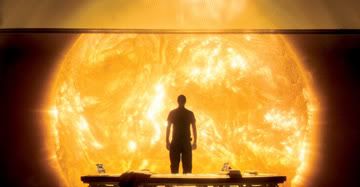

Archive: "Sunshine" (2007)
The year is 2057. The sun is dying and so is the Earth along with it. A massive spacecraft called Icarus had a mission to reignite the sun with a nuclear payload that would create a star within a star, but it mysteriously failed. An exact replica of the same spacecraft now called Icarus II has set out to repeat the same mission and hopefully save the dying sun and all of mankind with it. A group of eight men and women, who are all the best scientists and physicists, are on board the spacecraft to take on this daring journey in space. This is the premise of "Sunshine," a taught and riveting sci-fi thriller from director Danny Boyle ("Trainspotting," "Millions," "28 Days Later").
We're not told why the sun is dying, but with the movie only taking 50 years into the future, maybe it's too dangerous to even question. There's no unnecessary back story, and no needed look upon the troubles that may be occurring on Earth; it's all about the people in space and their mission. This is a very special and unique sci-fi movie that is meticulously crafted to present its characters with real issues and honestly devastating and complex scenarios that test their own will and judgement. These characters feel like real people in real danger; they're not the usual action-adventure super heroes. The actors (including Chris Evans, Cillian Murphy, and Rose Byrne) do a fine job of portraying the emotional struggle that comes along with a mission that has such dire consequences as these.
What happens when they don't have enough oxygen to make the trip there and back? The crew members are all informed by their talking computer system, which runs throughout the entire spaceship, that they would have enough oxygen if there were only four people. Who decides who gets to live? How can these judgments ever possibly get made? There comes a time where the crew reaches the point in which all communication to Earth is cut off. They are officially alone, a community amongst themselves, and with that, things can get pretty hostile. The crew also comes across an impossible distress signal from the failed Icarus. Should they go off-course to see if anybody's still alive on that spacecraft? It obviously interferes with the mission objective. But what if they find something beneficial there? What if the payload is still intact? Two chances at saving the Earth are definitely better than one.
All of this is what makes "Sunshine" so intense. The atmosphere on the spacecraft is at times gripping and at other times downright spooky. The tension we feel throughout the first two-thirds of the film suddenly and surprisingly expands exponentially into absolute terror. There's a plot twist here that happens after the crew discovers the first Icarus. I won't say anymore, however, because I dare not reveal too much. Let's just say that things get pretty odd, and you'll start wondering about whatever it is that you're watching. It all comes to a close with an unexpected bang.
Also unique are the visuals, which are hauntingly beautiful. There's an observation room on Icarus II that allows crew members to view the sun while still protecting them from its heat. It's truly majestic, especially during a scene where the crew watches Mercury gliding past their view. The retina-boiling brightness of the sun is presented well, bleaching out the screen at times, and it's a nice contrast against the dead cold of space.
Overall, the movie is simply more than you would expect going into it; there's something to be said about the fragility of human existence to go along with the action. Just like the talented director who who's behind it, this is a movie that effectively and brilliantly transcends genres.





No comments:
Post a Comment